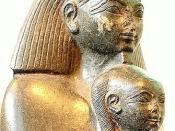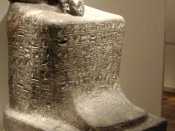Explain Hatshepsut's relations with Egyptian nobles and officials
To achieve the level of success and prestige that Hatshepsut aspired, she like all pharaohs needed skilled nobles and a huge bureaucracy to advise them in all aspects of administration. Perhaps the most famous of all her advisors is Senenmut. It is not known how he rose to prominence at court and how he won the trust and favour of Hatshepsut but he appears among her officials before the death of Thutmose 11. Senenmut may have started his career as an administrator in the Temple of Amun at Karnak. He also served as an official under Thutmose 11. It was at this time that he was appointed as steward and tutor or great nurse to her daughter, Neferure. One surviving statute shows him "nursing" Hatshepsut's small daughter.
Some historians have suggested that Senenmut may have been more than a close advisor to Hatshepsut and perhaps her lover.
Some historians also suggest that he may have been the father of Neferure. This view has been based on the great honours which Hatshepsut appears to have given him, such as the use of over eighty titles, the permission to have his name and image inscribed in her mortuary temple, permission to build two tombs at Sheikh Abd el-Qurna and under the forecourt of her mortuary temple. Also the corridors of his tomb were burrowed down towards the queen's temple, so that in death they could still be near. However there is no firm evidence that the relationship between Hatshepsut and Senenmut was sexual, which leads other historians to propose that Senenmut acquired such power and influence because he was the elder statesman of Hatshepsut's court. Even though Senenmut may have helped her carry out her plans, Hatshepsut's strongest support...


